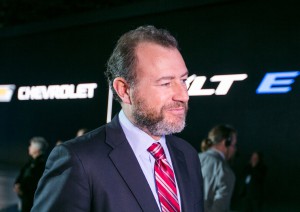
General Motors President Dan Ammann said the automaker is hoping government policy on fuel economy will help foster innovation.
Despite the uncertainty, General Motors is hoping the unfolding debate over fuel economy triggered by the administration of President Donald Trump will lead to an outcome that can foster innovation.
Ammann acknowledged as he fielded questions from reporters after an appearance at the Billington Cybersecurity Automotive Summit in Detroit that the proposal by the administration to freeze fuel-economy standards has created challenges.
“We’re obviously in a long-cycle business,” said Ammann, who was careful not to endorse the administration’s proposal, which also challenges the state of California’s ability to set its own fuel-economy and emission rules for automakers.
Roughly one of every eight new vehicles sold in the U.S. are sold in California and the total rises to close to 40% when sales of vehicles in states such as New York that follow California’s lead on fuel economy and emission standards.
(Automakers caught in limbo as new CAFE rules face major legal hurdles. Click Here for the story.)
“We’re very much behind having one national standard that we can work, to plan and deploy capital against,” Ammann added.
“Our overall goal obviously remains to improve fuel economy over time. All the work and energy behind that continues. We’d like to get clarity as soon as we can. We’d like to get to commonality as soon as we can. What we support is getting to one national standard. But we’d like to get to clarity as soon as we can,” he said.
Ammann added if the Trump administration’s initiative leads to some kind of compromise, it would certainly help GM and the auto industry. “One national standard if that’s an outcome of all the activity that’s going on right now would be positive,” he said.
GM also favors lifting the caps on federal tax credits for electric vehicles. Individual car makers can only offer the federal tax break to their first 200,000 EV customers. After that, the tax incentive vanishes.
“Things that can help drive the adoption of EVs today is going to help drive the whole industry,” added Ammann, who said GM is lobbying Congress and the Trump White House to lift the caps.
Ammann also said GM is also proposing that manufacturers, who deploy autonomous vehicles. also get credits that will can be utilized to offset the any fuel-economy and emission standards. “We think there should be some additional flexibility,” he said.
(For the complete story on what the CAFE changes include, Click Here.)
“I think are some areas that could help us drive to improve (better) fuel economy,” Ammann said. “Autonomous vehicles can have a huge impact,” he added.
The Trump administration’s proposal has set up a clash with the state of California, which over the years has been a major spur to innovation in the auto industry.
As it stands, California has vowed to fight the Trump administration’s efforts to pull back the current standards negotiated under President Barack Obama and call for carmakers to reach an average fuel economy of 54.5 miles per gallon.
Meanwhile, environmental groups are preparing to lead a major campaign against the administration’s proposal to scrap the standards set under Obama.
“We should be accelerating our efforts to reduce pollution in order to protect our health and planet,” Luke Tonachel, director for clean vehicles and fuels at NRDC, said on the call. “But under the Trump administration’s plan, consumers will be forced to shell out an additional $170 billion at the pump and hand it over to oil companies.”
“This proposal runs counter to a plain reading of the law, and if the Trump administration goes forward with it, we will challenge it — and we will prevail,” said Ben Longstreth, a senior attorney at NRDC. “The agencies have resurrected previously debunked arguments about why California cannot set its own standards. They lost in court last time they tried this, and we are confident they will lose again.”
(Click Here to see why auto suppliers are growing pessimistic about near-term prospects.)
“California’s devastating wildfires show the state has a compelling and extraordinary need to safeguard its air and fight the devastating effects of climate change,” said Simon Mui, the California lead for clean cars at NRDC.
